Greenlandic families fight to get children back after parenting tests banned
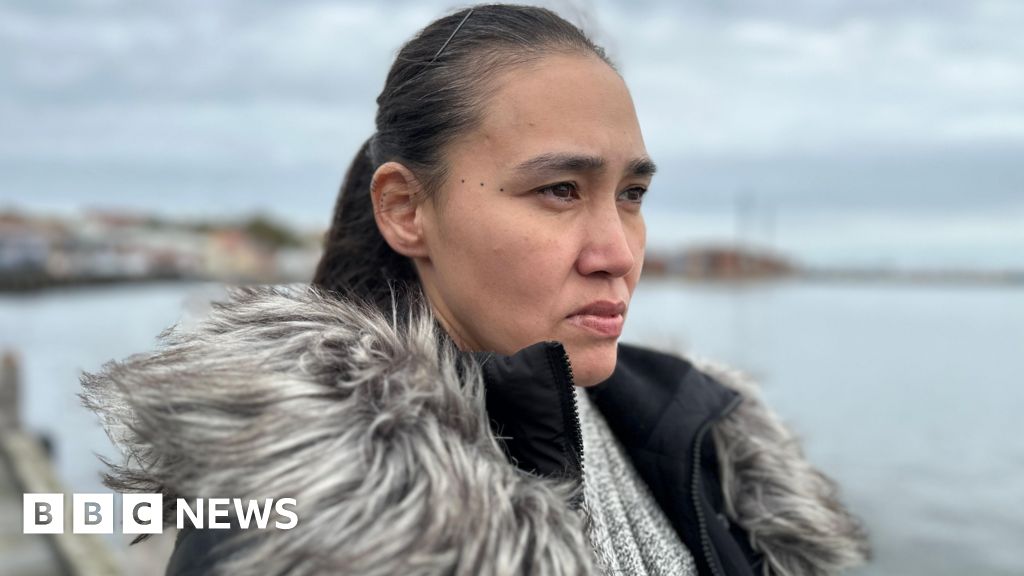
Sofia Bettiza,BBC Global Health Reporter and
Woody Morris,BBC World Service, Denmark
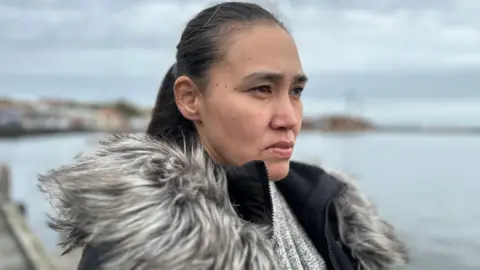 BBC
BBCWhen Keira’s daughter was born last November, she was given two hours with her before the baby was taken into care.
“Right when she came out, I started counting the minutes,” Keira, 39, recalls.
“I kept looking at the clock to see how long we had.”
When the moment came for Zammi to be taken from her arms, Keira says she sobbed uncontrollably, whispering “sorry” to her baby.
“It felt like a part of my soul died.”
Now Keira is one of many Greenlandic families living on the Danish mainland who are fighting to get their children returned to them after they were removed by social services.
In such cases, babies and children were taken away after parental competency tests – known in Denmark as FKUs – were used to help assess whether they were fit to be parents.
In May this year the Danish government banned the use of these tests on Greenlandic families after decades of criticism, although they continue to be used on other families in Denmark.
The assessments, which usually take months to complete, are used in complex welfare cases where authorities believe children are at risk of neglect or harm.
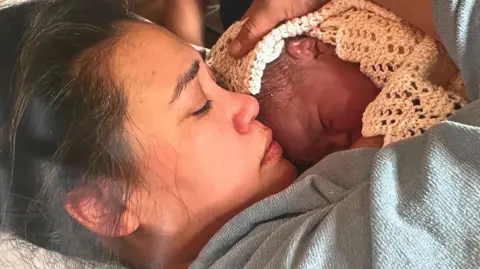
They include interviews with parents and children, a range of cognitive tasks, such as recalling a sequence of numbers backwards, general knowledge quizzes, and personality and emotional testing.
Defenders of the tests say they offer a more objective method of assessment than the potentially anecdotal and subjective evidence of social workers and other experts.
But critics say they cannot meaningfully predict whether someone will make a good parent.
Opponents have also long argued that they are designed around Danish cultural norms and point out they are administered in Danish, rather than Kalaallisut, the mother tongue of most Greenlanders.
This can lead to misunderstandings, they say.
Greenlanders are Danish citizens, enabling them to live and work on the mainland.
Thousands live in Denmark, drawn by its employment opportunities, education and healthcare, among other reasons.
Greenlandic parents in Denmark are 5.6 times more likely to have children taken into care than Danish parents, according to the Danish Centre for Social Research, a government-funded research institute.
In May, the government said it hoped in due course to review around 300 cases – including ones involving FKU tests – in which Greenlandic children were forcibly removed from their families.
But as of October, the BBC found that just 10 cases where parenting tests were used had been reviewed by the government – and no Greenlandic children had been returned as a result.
Keira’s assessment in 2024, carried out when she was pregnant, concluded that she did not have “sufficient parental competencies to care for the newborn independently”.
Keira says the questions she was asked included: “Who is Mother Teresa?” and “How long does it take for the sun’s rays to reach the Earth?”
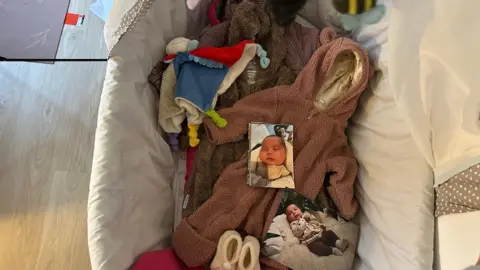
Psychologists who defend the tests argue questions like these are intended to assess parents’ general knowledge and their understanding of concepts they might encounter in society.
Keira adds that “they made me play with a doll and criticised me for not making enough eye contact”.
She alleges that when she asked why she was being tested in this way the psychologist told her: “To see if you are civilised enough, if you can act like a human being.”
The local authority in Keira’s case said it could not comment on individual families, adding that decisions to place a child in care were made when there was serious concern about the “child’s health, development, and well-being”.
In 2014, Keira’s other two children – who were then aged nine years and eight months – were placed into care after an FKU test at the time concluded her parenting skills were not developing fast enough to meet their needs.
Her eldest, Zoe, who is now 21, moved back home when she was 18 and currently lives in her own apartment and sees her mum regularly.
Keira hopes she will soon be reunited with her baby Zammi permanently.
The Danish government has said its review will look at whether mistakes were made in the administering of FKU tests on Greenlandic people.
In the meantime, Keira is allowed to see Zammi, who is in foster care, once a week for an hour.
Each time she visits, she takes flowers and sometimes Greenlandic food, such as chicken heart soup.
“Just so a little part of her culture can be with her,” she says.
‘I felt the most horrific heartbreak’
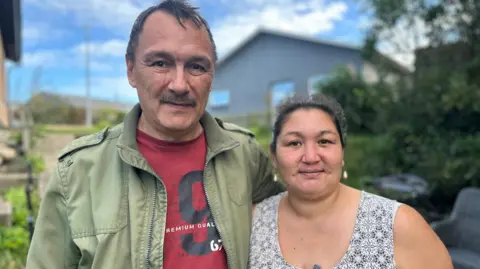
But not all Greenlandic parents who had children taken into care after completing FKUs will have their cases reviewed.
Johanne and Ulrik’s son was adopted in 2020 and the Danish government has said it will not review cases where children have been adopted.
Johanne, 43, was tested in 2019 during pregnancy.
Like Zammi, her son was meant to have been taken away immediately after birth.
But because he was born prematurely on Boxing Day and social workers were on holiday, she and her husband Ulrik got to keep him for 17 days.
“It was the happiest time of my life as a father,” says Ulrik, 57.
“Being with my son, holding him, changing his nappy, making sure that Johanne pumps her milk before going to bed in the evening.”
Then one day, two social workers and two police officers arrived at Johanne and Ulrik’s home to take their son away.
The couple say they pleaded with them not to take him.
Johanne asked if she could breastfeed him one last time.
“As I was dressing my son to hand him over to his foster parents who were on their way, I felt the most horrific heartbreak,” Ulrik says.
Johanne had been tested after two children from another relationship, who were five and six, were taken into care after FKU testing in 2010.
Her 2019 assessment describes her as “narcissistic” and as having “mental retardation” – a categorisation based on designations developed by the WHO which were in use at the time.
She rejects both of these descriptions of her.
 Getty Images
Getty ImagesIn theory, there is no pass or fail mark for an FKU and they are one factor among others taken into consideration by local authorities who decide whether to place a child into care.
But psychologist Isak Nellemann, who used to administer the tests, says in practice they “are very important, about the most important thing, because when the tests are bad, in about 90% [of cases] they will lose their children”.
Nelleman argues the tests lack scientific validity and were developed to study personality traits rather than predict parenting ability.
However, Turi Frederiksen, a senior psychologist whose team currently administers the tests, defends them, saying that while they are not perfect, “they are valuable, extensive psychological tools”.
She also says she does not believe they are biased against Greenlanders.
When Johanne was asked in 2019 what she saw during a Rorschach test – a psychological test where people are asked what they see when looking at ink-blot images – she said she saw a woman gutting a seal, a familiar sight in Greenland’s hunting culture.
Johanne alleges that on hearing this answer the psychologist called her a “barbarian”.
The local council involved in the couple’s 2019 assessment did not address Johanne’s claim directly.
They said her assessment “indicated significant concern regarding the parents’ overall parenting abilities” as well as “concerns about the parents’ general lifestyle and functional level in daily life”.
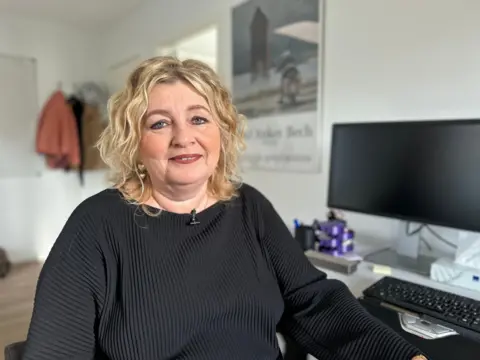
‘I never got to see his first steps’
After Johanne and Ulrik’s son was taken into care, they were allowed to see him during brief, weekly visits until he was adopted in 2020.
They have never seen him since.
“I never got to see his first steps, his first word, his first tooth, his first school day,” Johanne says.
However, a few days after his birth they christened him, creating an official record that includes their names and address.
“We needed to create a paper trail so he could find his way back to us,” Johanne says.
Their lawyer Jeanette Gjørret hopes to take their case before the European Court of Human Rights.
But Denmark’s social affairs minister Sophie Hæstorp Andersen tells the BBC the government will not reopen cases of adoption because each of these children is now settled with a “loving and caring family”.
Asked about the progress of the review, she says “it sounds slow, but we are getting started”.
She also says decisions to remove and adopt children are part of a “very thorough process where we look into the family’s ability to take care of their child not only for a year or two, but for a long period of time”.
That is echoed by Tordis Jacobsen, a social worker team leader in Aalborg Kommune in northern Denmark, who says removing a child in Denmark is never taken lightly.
She says safeguarding concerns are often first flagged by schools or hospitals, and points out that in cases where a child is permanently adopted the decision to approve this is made by a judge.
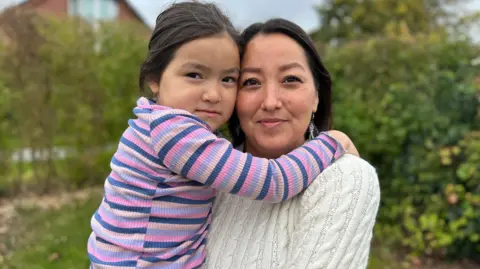
Pilinguaq is a rare case of a Greenlandic mother who has been reunited with her child.
She and her daughter, who was placed into care aged one, were reunited a few months ago. Her daughter is now six.
Pilinguaq, 39, says she received the unexpected news in a phone call from social services.
“I started crying and laughing at the same time. I couldn’t believe it. I kept thinking, ‘Oh my God, she’s coming home.'”
Pilinguaq’s three children were all placed into care in 2021. The other two were aged six and nine at the time.
She says she agreed for her local authority to place her children in temporary care while she found a new home suitable for her children.
Pilinguaq says she believed her children would soon be returned to her, but instead she had to undergo a parenting assessment.
This concluded she had a pattern of entering “dysfunctional relationships” and was unfit to parent.
‘They can take her in one hour’
A few months after her six-year-old daughter came home, Pilinguaq was told by her local authority that her other two older children will be returning to her in December.
The decision to return the children into Pilinguaq’s care was made by the local authority rather than being recommended by the government review. The local authority declined to comment on her case.
Spending more than four years apart has made it difficult for Pilinguaq to rebuild her relationship with her daughter.
“If I go to the bathroom and close the door, she will have a panic attack and say ‘Mum, I couldn’t find you,'” Pilinguaq says.
She also says she is terrified of losing her daughter again.
“They can take her in one hour. They can do it again.”
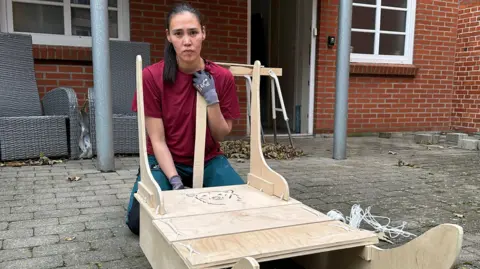
Keira is now preparing for Zammi’s first birthday in her absence.
She’s building a traditional Greenlandic sleigh by hand from wood, with a polar bear drawn on the front.
Earlier this month, she was told that her daughter won’t be coming home – for now at least – but she hasn’t given up hope.
Keira still has a cot next to her bed and another in the living room, with framed photos of Zammi on the walls, along with baby clothes and nappies.
“I will not stop fighting for my children.
“If I don’t finish this fight, it will be my children’s fight in the future.”

- This is part of the Global Women series from the BBC World Service, sharing untold and important stories from around the globe
Source link


